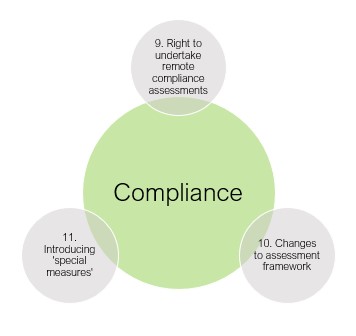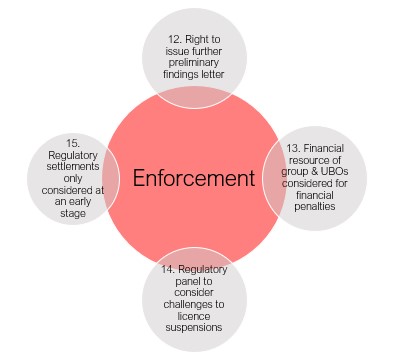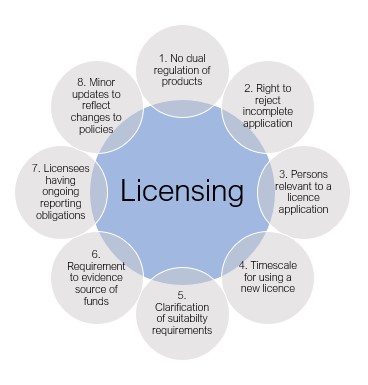Reporting of Deaths by Suicide: consequence and practical implementation
The Gambling Commission’s consultation on three changes it proposes to make to its Licence Conditions and Codes of Practice (the “Consultation”) is due to close on 23 May 2023 and there is one issue to which licensees should pay careful attention: the proposal to add a specific reporting requirement to Licence Condition 15.2.2 requiring licensees to notify the Gambling Commission when they become aware that a person who has gambled with them has died by suicide.
The Gambling Commission’s proposed wording is:
“The licensee must notify the Commission, as soon as reasonably practical, if it knows or has reasonable cause to suspect that a person who has gambled with it has died by suicide, whether or not such suicide is known or suspected to be associated with gambling. Such notification must include the person’s name and date of birth, and a summary of their gambling activity, if that information is available to the licensee”.
There is no question of licensees not wishing to prevent suicide and ostensibly, the arguments in favour of this proposed requirement are logical and reasonable. However, this is an incredibly sensitive issue about which stakeholders will have opposing views. Indeed, we have some concerns ourselves: that a gambler commits suicide does not necessarily mean that the gambling is a contributory factor, nor is the Gambling Commission qualified to make such a judgement. It is therefore questionable whether it is appropriate for the Gambling Commission to require the provision of information of this nature.
As has been the case on many occasions in the past, the Gambling Commission is likely to proceed with imposing this requirement, irrespective of the responses it receives to the Consultation. Consequently, rather than explore the basis of the proposed requirement, this article considers its wording and impact, which as presently drafted potentially exposes licensees to a risk of regulatory bias, imposes a disproportionate burden upon them and is likely to be interpreted inconsistently.
Intention and consequence
The Gambling Commission explains in the Consultation that, in the past, some licensees have notified it when they have become aware that a customer has died by suicide; likely under ordinary code provision 1.1.1 which suggests that, as a matter of good practice licensees should inform the Gambling Commission “of any matters that the Commission would reasonably need to be aware of in exercising its regulatory functions”. However, to enable it to “assess the licensee’s compliance with conditions of its licence” and to help “inform ongoing consideration of policy” the Gambling Commission has determined it necessary to make this notification a licence condition, the breach of which would enable it to commence enforcement action and if appropriate impose a regulatory sanction.
The Gambling Commission also states in the Consultation that, to avoid placing a burden on licensees to determine which deaths by suicide they should notify it about, it proposes that “licensees are required to notify us where a person who has gambled with them has died by suicide irrespective of whether any link between the person’s death and gambling has been established or suggested” and that “the death should be notified to the Commission irrespective of the period of time that has elapsed between the death and the most recent gambling activity.”
The Gambling Commission, many of its key stakeholders, and indeed many of its critics, have made it abundantly clear that gambling related suicide must be a key focus, and rightly so. However, suicide is almost invariably the result of a complex array of factors, and it cannot be the case that irrespective of the time that has lapsed between an individual’s gambling and their suicide, gambling will necessarily have been a contributory factor. An investigation is therefore inevitable, and care needs to be taken by the Gambling Commission when conducting that investigation to ensure that there is no internal regulatory bias on its part: its focus should be on licensee’s adherence to their regulatory requirements and not to the tragic circumstances that have led to the notification being submitted.
A regulatory bias in relation to gambling related suicide, or at least an indication of it, is evident in the Gambling Commission’s consultation Customer Interaction – Guidance for remote operators, where the Gambling Commission tells licensees that their staff “need to be trained on the skills and techniques they need to help them carry out customer interactions, including what to do if a customer becomes distressed or there is a risk of suicide”. Wording such as this suggests that, in the Gambling Commission’s view, it is the responsibility of licensees or their employees to identify the risk of suicide, and to act upon it. As we have set out in a previous article, this cannot be right: it is the responsibility of qualified professionals to identify that risk, not licensees, and it is dangerous on multiple levels, including in relation to the wellbeing of licensees’ employees, to suggest otherwise. Further, this risks suggesting there is a duty of care at law on the part of licensed gambling operators to prevent suicide, which is a dangerous precedent.
Whether or not licensees are expected to investigate, the Gambling Commission will be doing so. The extent of that investigation is likely to extend beyond the licensee who has submitted the notification: how else will the Gambling Commission ensure that all licensees are adhering to the licence condition and/or that the individual concerned has not gambled elsewhere? Having been identified it is therefore inevitable that the Gambling Commission will have to request information from other licensees; the burden on licensees potentially extending considerably and a consistent and proportionate response difficult to maintain. If gambling is a contributory factor, we suggest it is more likely than not the individual will have gambled with many operators.
As most licensees who have been through a burdensome compliance or enforcement investigation process with the Gambling Commission have experienced, the Gambling Commission can be very unforgiving in its approach, 20/20 hindsight is applied and it is rare that such a process leaves a licensee unscathed. Many licensees have found themselves subject to criticism, and in some cases may have agreed a regulatory settlement, in cases where theirs and the Gambling Commission’s view about some failings identified are not perfectly aligned. Following a notification under this proposed requirement, licensees might be forgiven for being concerned about how any Gambling Commission investigation will be conducted and any consequences of that investigation, particularly given the risk of unintentional bias and the imbalance of power between the regulator and its licensees.
Practical implementation: expectation versus reality
The Gambling Commission states in the Consultation that:
- its “current view is that licensees should notify when they become aware that a person who has gambled with them has died by suicide”;
- it proposes a specific reporting requirement that “would impose a requirement on gambling licensees to notify the Commission if they become aware that a person who has gambled with them has died by suicide”;
- that licensees “would only be able to notify us that a person who has gambled with them has died by suicide if they themselves are aware of this, either through direct contact or other means, such as media reports”; and
- it “would not expect licensees to actively investigate or verify the information in order to make such disclosures – rather, would expect licensees to notify the Commission if they become aware of a death by suicide of any person who has gambled with them (for example, through media reports or notification from relatives of the deceased).”
However, the draft wording of the proposed license condition is ambiguous and goes further than the Gambling Commission’s stated intention in the Consultation. It not only refers to actual knowledge but also to a much broader “reasonable cause to suspect”. This risks imposing a disproportionate regulatory burden on licensees. What amounts to reasonable suspicion will almost certainly be interpreted differently and will ultimately be determined by the Gambling Commission subjectively and in hindsight. Further, the breach of a licence condition amounts to a criminal offence under the 2005 Act, and can lead to various regulatory sanctions, including revocation and the imposition of a financial penalty. Licensees are therefore likely to take a precautionary approach when considering whether a notification is required.
Unlike actual knowledge, which is precise and unambiguous, a licensee’s reasonable cause to suspect that a customer who has gambled with it has died by suicide could be considered to arise in various ways, for example: (1) if they are informed by a customer that they are having suicidal thoughts following which all customer contact ceases without any known explanation or reason; (2) if public information about an individual who has died by suicide exists; or (3) if a licensee is informed that a customer who has self-excluded with them has died, but the cause of death is unknown. To avoid criticism in hindsight from the Gambling Commission about what amounted to reasonable cause to suspect, licensees will inevitably carry out an active investigation or verification exercise. The draft provision therefore appears to conflict with the Gambling Commission’s stated position in the Consultation that an active investigation is not required and this imposes a disproportionate burden on licensees.
This complication is most likely caused by ambiguous drafting, rather than by a malicious desire by the Gambling Commission to extend the reach of the draft provision. However, to ensure clarity of understanding, mitigate the risk of inconsistent interpretation by the Gambling Commission, and prevent the unreasonable or disproportionate use of the draft provision in the future, the Gambling Commission should be encouraged to address this ambiguity. Clarity could easily be achieved either by including additional wording in the draft provision that expressly states that active investigation or verification by licensees is not required, or by amending the draft provision entirely. Alternative and more appropriate wording that will retain the Gambling Commission’s desired objective might be:
“The licensee must notify the Commission, as soon as reasonably practicable, if it knows that a person who has gambled with it has died, and knows or has reasonable cause to suspect that the person has died by suicide.”
Please get in touch with us if you would like assistance with any compliance or enforcement matters.


